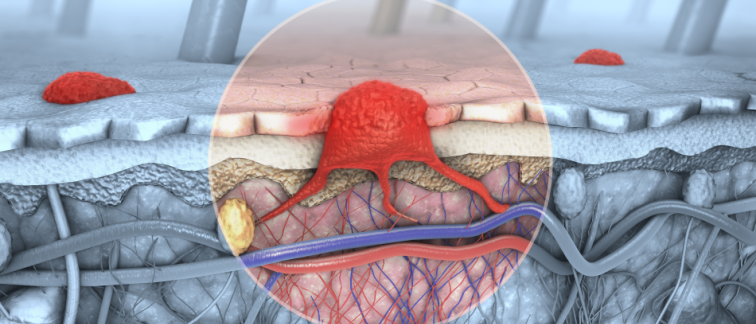Melanoma poses a significant health challenge worldwide. In the Netherlands alone, over 8,000 individuals are diagnosed with this skin cancer annually, a number that is increasing by 4% each year. While most people are diagnosed with stage I melanoma, approximately 14% are identified at stage II. At this stage, 15-20% of patients are likely to develop metastases within five years, progressing to stage III.
Sentinel gland examination is a common method to identify high-risk stage II patients, but the sensitivity of this procedure is poor, as evidenced by the fact that patients with negative sentinel node results still have a significant risk of progression.
Gap in Diagnostic Precision
Recent advances in immunotherapy for Stage II melanoma patients have shown promising improvements in survival rates and treatment efficacy. However, treating all stage II patients is not feasible.
“Treating every stage II patient with immunotherapy after surgery is not an option because of high toxicity, reduced quality of life, with associated overtreatment of patients who would not progress, and the extremely high cost,” says Wouter Ouwerkerk, a Research Fellow affiliated with Cancer Center Amsterdam.
What is missing is a diagnostic test that is capable of accurately identifying a patient’s risk of progression. With funding from CCA Foundation, Wouter intends to pursue a reliable biomarker that would not only streamline the identification of patients who could benefit most from adjuvant immunotherapy, but also alleviate the burden of uncertainty for those at low risk, sparing them unnecessary treatments.
“We know that genetic factors are involved in the metastatic behavior of melanoma cells,” says Wouter. “If we compare the DNA of patients who progress with those who do not, we might be able to find variations in the genetic code associated with the metastatic potential of their cancer.”
Power of Collaboration
Dr. Ouwerkerk will leverage the power of an international collaboration named Immuno-oncology Germline Genetics in Melanoma (IO GEM), of which he is also the coordinator. This consortium brings together researchers from 45 participating center across the US, Europe and Australia to investigate the relationship between germline genetics and response to immunotherapy of patients with metastatic melanoma. The involvement of international researchers and access to vast patient cohorts in the UK and Australia provides a strong foundation for this study.
“By having access to these cohorts, I have the unique opportunity to answer the question of whether germline genetics plays a role in the metastatic risk of early-stage melanoma and if this can be used as a biomarker,” says Wouter.
Laying the Groundwork
The project's approach is twofold: identifying genetic mutations that differentiate metastatic from non-metastatic melanoma, and pinpointing polygenic risk scores that can accurately predict a patient's risk of metastasis. Polygenic risk scores combine the effects of multiple genetic variants across the genome to estimate an individual's genetic predisposition to certain diseases or traits.
By validating these findings across diverse patient populations, including a selection from the Amsterdam UMC archives, the study not only seeks to advance our understanding of melanoma but also to lay the groundwork for future research and potential innovative treatment.
For more information, contact Wouter Ouwerkerk.
Project Title: Germline genetic biomarker to predict metastatic risk in melanoma patients
Text by Laura Roy.
This article was created for Cancer Center Amsterdam.
Follow Cancer Center Amsterdam on LinkedIn & Twitter /X.
© 2024 New Haven Biosciences Consulting– All rights reserved.

